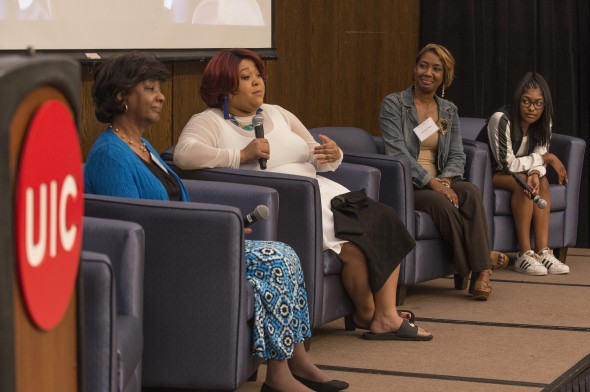Trust, diversity in clinical trials

Family members of Henrietta Lacks share their experiences during a UI Cancer Center panel discussion about trust and diversity in clinical trials. From left: Shirley Lacks, daughter-in-law; Veronica Robinson, great-granddaughter; Jeri Lacks Whye, granddaughter; and JaBrea Lacks Whye, great-great-granddaughter of Henrietta Lacks. Photo: Lloyd DeGrane
More than 500 Chicago and campus community members attended a UI Cancer Center event July 7 designed to engage individuals from diverse backgrounds in a conversation about the need for improved trust and diversity in clinical trials.
Headlining the event was testimony from members of the family of Henrietta Lacks (1920–1951), a black woman whose cancer cells were used without her knowledge in medical research as the source of countless medical breakthroughs, such as chemotherapy, the polio vaccine and genetic mapping. It was not until nearly 25 years after her death that Lacks’ family became aware of the cell line, called HeLa cells.
“We found out like everyone else — by accident,” said Veronica Robinson, great-granddaughter of Henrietta Lacks, during a panel discussion. Robinson said the family did not know about the cells until, due to cross contamination in a lab, scientists had to recognize openly where the cells came from.
“Because she wasn’t educated, she was taken advantage of,” Robinson said. “My family had to go through a lot of hurt.”
“The Henrietta Lacks story has awakened the country,” said Robert Winn, associate vice chancellor for community-based practice and director of the cancer center. The legacy of Henrietta Lacks, he said, is an example of why many minority communities are hesitant to get involved in clinical trials — a tradition of mistreatment and disregard — and is an example of how it’s possible to change that tradition.
Winn said his goal for the cancer center is to engage with all people, especially those who are underrepresented, and to build trust by being part of the community.
“We are about making sure that cures are accessible to everybody,” Winn said. “Every single one of us deserves a seat at the table.”
A second panel was moderated by Dara Richardson-Heron, chief engagement officer of the National Institutes of Health’s All of Us Research Program, a historic effort to gather data from more than one million people living in the United States to develop population-specific treatments for disease and improve health.
UIC is one of three institutions in Chicago selected to participate in the All of Us program, which will enroll 150,000 Illinoisans into the program beginning this fall.
“It’s so vitally important for people like me, and others, who have been traditionally underrepresented in biomedical research to enroll and participate, as participant partners, in the All of Us Research Program,” Richardson-Heron said. “We don’t just want a seat at the table, we want to determine the agenda and pick the menu.”
RoseMarie Rogers, a black woman and 22-year cancer survivor, also urged people to enroll in clinical trials.
“We can’t focus on things that have happened in the past, and the only way to heal diseases is for us to become involved in the research,” Rogers said.
The event ended with a screening of the HBO film “The Immortal Life of Henrietta Lacks,” which was adapted from a New York Times‘ best-seller of the same title, written by Rebecca Skloot.
